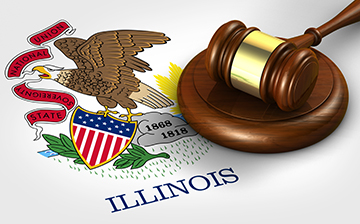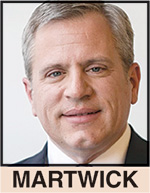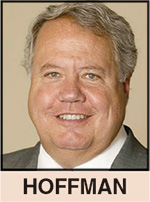Other Labor bills advance to the governor
By CARL GREEN
Illinois Correspondent
 Springfield, IL – Gov. J.B. Pritzker’s proposed constitutional amendment to move Illinois from its current, unfair flat tax to a progressive income tax – he calls it the Fair Tax – was inching toward a final vote in the Legislature last week, setting the stage for voters to decide the measure next year.
Springfield, IL – Gov. J.B. Pritzker’s proposed constitutional amendment to move Illinois from its current, unfair flat tax to a progressive income tax – he calls it the Fair Tax – was inching toward a final vote in the Legislature last week, setting the stage for voters to decide the measure next year.
Meanwhile, several other bills supported by Labor were moving toward passage or signed by the governor as the end of the spring legislative session neared.
The House Revenue and Finance Committee approved the proposed constitutional amendment on a 9-6, party line vote May 20. Last week, sponsors were hustling to round up the 71 votes needed to pass it through the full House. The Senate passed it May 1 on a 40-19 party line vote.
Republicans say they will vote as a bloc against it, so almost all of the House’s 74 Democrats must vote yes for it to advance. Party leaders said they were close to securing the votes last week to place the referendum on the ballot in 2020. Voters would need to approve the measure by at least a 60 percent majority for it to pass.
CORRECTING INEQUITIES IN STATE TAX SYSTEM
 Michael Carrigan, president of the Illinois AFL-CIO, says under the current flat tax structure, the wealthiest pay a combined seven percent of their income on state and local taxes, while the middle-class pays a whopping 13 percent. “This proposal will finally correct some long-standing inequities in our tax system,” Carrigan said. “It will relieve pressure on the middle class and force the wealthy to pay their fair share.”
Michael Carrigan, president of the Illinois AFL-CIO, says under the current flat tax structure, the wealthiest pay a combined seven percent of their income on state and local taxes, while the middle-class pays a whopping 13 percent. “This proposal will finally correct some long-standing inequities in our tax system,” Carrigan said. “It will relieve pressure on the middle class and force the wealthy to pay their fair share.”
The actual rate structure would be established with separate legislation, now before the House.
 House sponsor, Rep. Rob Martwick (D-Chicago) said it would be the fairest way to deal with persistent revenue shortfalls. Without it, he said, the current flat rate would need to go up from 4.95 percent to 6.5 percent to pay the state’s debts and balance the budget.
House sponsor, Rep. Rob Martwick (D-Chicago) said it would be the fairest way to deal with persistent revenue shortfalls. Without it, he said, the current flat rate would need to go up from 4.95 percent to 6.5 percent to pay the state’s debts and balance the budget.
“I believe that the worst thing that we do for businesses in this state is the irresponsible manner in which we have run our finances,” Martwick said. “The accumulation of debt is constantly putting pressure on income taxes to rise. It is crowding out our ability to fund programs, which are then pushed off to the local level, which winds up with high property taxes.”
METRO EAST MAYORS BACK IT
 Ten Metro East mayors gathered to announce their support for the plan. “A huge component, at least for me, is the much-needed property tax relief that it will give families across the state,” Swansea Mayor Mike Leopold said at the event.
Ten Metro East mayors gathered to announce their support for the plan. “A huge component, at least for me, is the much-needed property tax relief that it will give families across the state,” Swansea Mayor Mike Leopold said at the event.
Also endorsing the plan were mayors Mark Eckert of Belleville, Rickie Thomas of Washington Park, Curtis McCall Jr. of Cahokia, Michael Suarez of Fairmont City, Mike Todd of Millstadt, Marius Jackson of Centreville, Tyrone Echols of Venice and Emeka Jackson-Hicks of East St. Louis.
LABOR-SUPPORTED BILLS
Other Labor-supported bills that have either passed or been signed by the governor include:
- Two-member rail crews – A bill filed by Rep. Jay Hoffman (D-Swansea) to require at least two crew members on rail carriers for safe passage through Illinois passed the House 77-36 on May 21 on a party line vote, with Republicans voting against it. The measure previously passed the Senate.
The International Association of Sheet Metal, Air, Rail and Transportation Workers — Transportation Division (SMART TD) and the Brotherhood of Locomotive Engineers and Trainmen (BLET) both support two-person crews.
 “Currently, there are not any state or federal laws dictating how many crew members are necessary to safely operate freight trains on Illinois railroads,” Hoffman said. “This bill is an effort to ensure that freight train engineers have the necessary support and flexibility they need to adapt in situations of mechanical breach or failure. This is a huge public safety issue.”
“Currently, there are not any state or federal laws dictating how many crew members are necessary to safely operate freight trains on Illinois railroads,” Hoffman said. “This bill is an effort to ensure that freight train engineers have the necessary support and flexibility they need to adapt in situations of mechanical breach or failure. This is a huge public safety issue.” - Asbestos exposure – Pritzker signed into law new workers’ compensation rules that will override the statute of limitations so workers exposed years ago to asbestos can still get compensation. Hoffman and Rep. Katie Stuart (D-Edwardsville) were co-sponsors.
- Hazardous workplaces – The Senate unanimously passed Hoffman’s bill amending the Workers Compensation Act to raise penalties for non-compliance in cases of extra-hazardous workplaces. It passed the House earlier and will go to the governor.
- Charter schools – Teachers’ unions supported a bill to abolish the State Charter School Commission and transfer its authority to the State Board of Education and local school districts, in a major blow to the charter schools movement. The Senate passed it in April and the House followed suit May 21.
 Graduate assistants – The Senate, again led by Democrats, passed a bill May 21 to recognize graduate research assistants as employees, as teaching assistants already are, and thus eligible for collective bargaining and other employee rights. “Everyone should be treated with respect in the workplace,” said the sponsor, Sen. Laura Fine (D-Glenview). “These graduate and research assistants should have the same opportunities as their educational colleagues.”
Graduate assistants – The Senate, again led by Democrats, passed a bill May 21 to recognize graduate research assistants as employees, as teaching assistants already are, and thus eligible for collective bargaining and other employee rights. “Everyone should be treated with respect in the workplace,” said the sponsor, Sen. Laura Fine (D-Glenview). “These graduate and research assistants should have the same opportunities as their educational colleagues.”- Harmful chemical – Both the House and Senate passed a ban on business use of bisphenol-A in paper for business records such as cash register, debit card and sales receipts. United Food and Commercials Workers Local 881 is among the supporters.
 “Tens of thousands of workers and even more consumers are in contact with these papers every day,” said Zach Koutsky of Local 881. “Whether you are on the job or simply going shopping, you deserve to be safe from harmful chemicals.”
“Tens of thousands of workers and even more consumers are in contact with these papers every day,” said Zach Koutsky of Local 881. “Whether you are on the job or simply going shopping, you deserve to be safe from harmful chemicals.” - Wage history – The Senate voted 41-14 on May 22 to pass House Bill 834, which would prohibit employers from screening job applicants’ wage histories, requiring that prior wages meet minimums or maximums or requiring disclosure of previous wages. The House passed it in March, with Katie Stuart among the sponsors. It went into the conference committee.
- Prompt payment – The House voted 98-13 on May 23 to approve the Contractor Prompt Payment Act, previously passed by the Senate, which would limit retainers withheld from construction contracts to no more than 10 percent before half-completion and no more than 5 percent after that.
- Labor history – The Senate passed House Bill 2215, which would require teaching the history of the fire service Labor Movement in the training curriculum for firefighters. It passed the House in February.
- Workplace rights – Senate Bill 1694 would require high schools to teach a unit on workplace rights, including legal protections against sexual harassment and racial discrimination. It was passed unanimously in the House May 23 and the Senate on April 12.
Illinois capital spending bill seeks $41.5 billion for six years of work
Springfield, IL – Some details of Illinois’ long anticipated capital bill – the first in 10 years – were finally unveiled last week, with plans for $41.5 billion in work over six years, to be called “Rebuilding Illinois.”
Of that amount, $28.6 billion would be for transportation projects.
The transportation money would include $11 billion to improve existing roads and bridges, $12 billion for new roads and bridges and $3.4 billion for mass transit improvements.
The Belleville News-Democrat reported the plan includes $24 million to reroute U.S. 67 in Jersey County as a four-lane highway connecting to the existing four-lane section approaching Alton. It also includes a health sciences building at SIU-Edwardsville, plus deferred maintenance for the communications building at SIU-Carbondale.
The last capital bill, passed in 2009 under Governor Pat Quinn, totaled $31 billion and was called “Illinois Jobs Now!”
NEW REVENUE
The plan is to raise $1.8 billion in new annual revenue from doubling the motor fuel tax to 38 cents a gallon, adding a $1 per ride tax on ride sharing services and a seven percent tax on cable, satellite and streaming services and raising alcohol taxes.
Vehicle registration fees would rise from $101 a year to a tiered system in which newer cars would cost more, including $109 for vehicles 12 years and older, $139 for 7 to 11 years, $169 for 4 to 6 years, and $199 for three years or less. Fees on electric cars would rise from $34 every other year to $250 – every year.
It had not been determined which of these tax and fee increases, among other proposals, would make it into the final legislation. In addition, the plan included obtaining $17.8 billion in bonds and $10 billion in federal funding.
BEYOND ROADS
Rebuilding Illinois would also include $5.9 billion for education projects and maintenance, $4.4 billion for state facilities and $1 billion for conservation.
The program was welcomed in the Democratic-controlled legislature.
 “We’ve been eagerly awaiting a framework from the Pritzker administration,” said Sen. Martin Sandoval (D-Chicago) lead negotiator for Senate Democrats. “As the Senate has gone around the state and led this bipartisan effort, there have been many changes, and I expect many more to come. What you have here is an early draft of what a framework could look like. Going forward. I hope the Governor is as committed as I’ve been to an open, bipartisan process.”
“We’ve been eagerly awaiting a framework from the Pritzker administration,” said Sen. Martin Sandoval (D-Chicago) lead negotiator for Senate Democrats. “As the Senate has gone around the state and led this bipartisan effort, there have been many changes, and I expect many more to come. What you have here is an early draft of what a framework could look like. Going forward. I hope the Governor is as committed as I’ve been to an open, bipartisan process.”
In Senate hearings leading up to the plan, Sen. Andy Manar (D-Bunker Hill) described the need for new funding to tackle the state’s infrastructure problems.
 “The depth and breadth of the state’s infrastructure needs is mind-boggling,” he said. “The takeaway from these Senate hearings is simple – there is a tremendous need throughout Illinois for highway construction, bridge repairs, college and university building projects, environmental investments and more. Our challenge is finding a way to pay for them.”
“The depth and breadth of the state’s infrastructure needs is mind-boggling,” he said. “The takeaway from these Senate hearings is simple – there is a tremendous need throughout Illinois for highway construction, bridge repairs, college and university building projects, environmental investments and more. Our challenge is finding a way to pay for them.”

